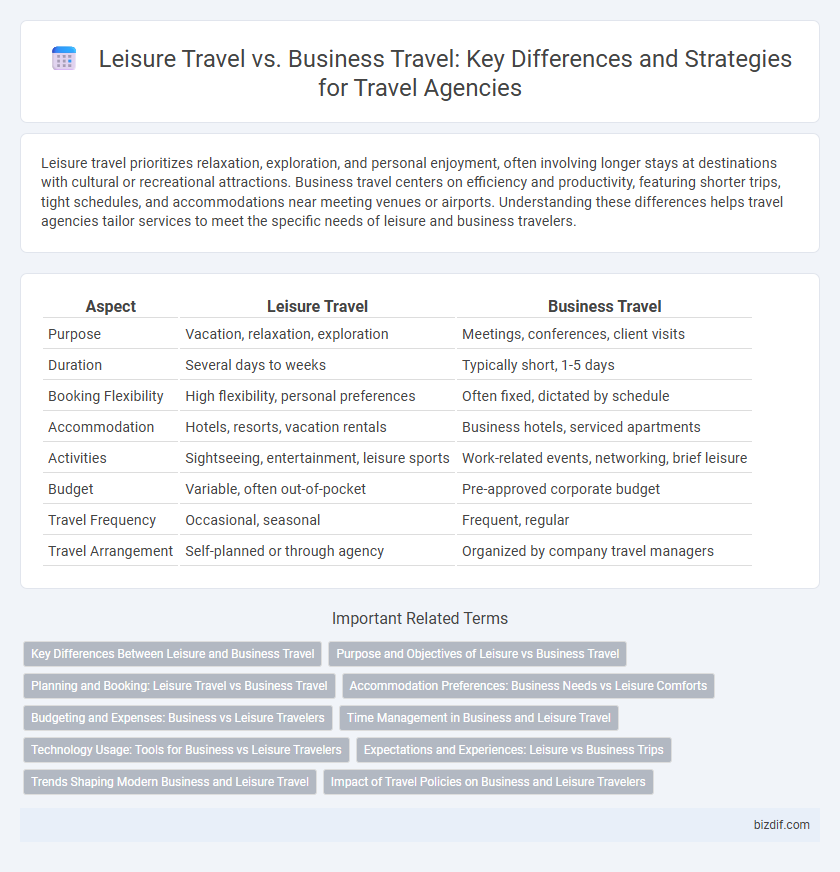Leisure travel prioritizes relaxation, exploration, and personal enjoyment, often involving longer stays at destinations with cultural or recreational attractions. Business travel centers on efficiency and productivity, featuring shorter trips, tight schedules, and accommodations near meeting venues or airports. Understanding these differences helps travel agencies tailor services to meet the specific needs of leisure and business travelers.
Table of Comparison
| Aspect | Leisure Travel | Business Travel |
|---|---|---|
| Purpose | Vacation, relaxation, exploration | Meetings, conferences, client visits |
| Duration | Several days to weeks | Typically short, 1-5 days |
| Booking Flexibility | High flexibility, personal preferences | Often fixed, dictated by schedule |
| Accommodation | Hotels, resorts, vacation rentals | Business hotels, serviced apartments |
| Activities | Sightseeing, entertainment, leisure sports | Work-related events, networking, brief leisure |
| Budget | Variable, often out-of-pocket | Pre-approved corporate budget |
| Travel Frequency | Occasional, seasonal | Frequent, regular |
| Travel Arrangement | Self-planned or through agency | Organized by company travel managers |
Key Differences Between Leisure and Business Travel
Leisure travel primarily involves personal enjoyment and relaxation, often characterized by flexible itineraries and extended stays at vacation destinations, whereas business travel emphasizes efficiency, tight schedules, and proximity to meetings or conferences. Expenses for leisure trips are usually out-of-pocket or reimbursed differently, while business travel costs are often covered by employers, with specific policies and budgeting constraints in place. Accommodation preferences also diverge, with leisure travelers opting for resorts or vacation rentals and business travelers choosing hotels offering business amenities like conference rooms and Wi-Fi.
Purpose and Objectives of Leisure vs Business Travel
Leisure travel primarily aims to provide relaxation, entertainment, and cultural experiences, focusing on personal enjoyment and exploration. Business travel is driven by professional objectives such as attending meetings, conferences, negotiations, and fostering client relationships. The purpose of leisure travel centers on recreation and escape, while business travel targets productivity and networking outcomes.
Planning and Booking: Leisure Travel vs Business Travel
Leisure travel planning often prioritizes flexible itineraries, personalized experiences, and budget-friendly options, while business travel emphasizes efficiency, strict schedules, and corporate policies. Booking for leisure trips typically involves researching accommodations and activities for relaxation and entertainment, whereas business travel bookings focus on convenience, direct flights, and proximity to meeting venues. Travel agencies specializing in both sectors optimize their services by tailoring booking platforms to accommodate varying traveler needs and preferences.
Accommodation Preferences: Business Needs vs Leisure Comforts
Business travelers prioritize accommodations offering high-speed Wi-Fi, convenient workspaces, and proximity to conference centers to facilitate productivity and efficient scheduling. Leisure travelers prefer comfortable, spacious rooms with amenities such as pools, spas, and entertainment options to enhance relaxation and enjoyment. Hotels catering to both segments balance functionality with luxury by providing flexible room setups and diverse on-site services.
Budgeting and Expenses: Business vs Leisure Travelers
Business travelers typically have higher budgets allocated for airfare, accommodations, and meals due to company policies and the need for convenience and efficiency. Leisure travelers prioritize cost-effective options, often seeking discounts, package deals, and flexible schedules to maximize their vacation experience while minimizing expenses. Expense management software and travel policies play crucial roles in controlling business travel costs, whereas leisure travel budgeting relies heavily on personal finance planning and seasonal promotions.
Time Management in Business and Leisure Travel
Business travel prioritizes efficient time management to maximize productivity, often involving tightly scheduled meetings and seamless transitions between destinations. Leisure travel allows for flexible itineraries, enabling travelers to relax and explore at their own pace without strict time constraints. Effective time management in both travel types enhances overall experience, balancing work obligations with personal enjoyment.
Technology Usage: Tools for Business vs Leisure Travelers
Business travelers heavily rely on advanced technology tools such as expense management apps, virtual meeting platforms, and real-time itinerary updates to enhance productivity and streamline workflows. Leisure travelers prioritize user-friendly booking apps, personalized recommendation engines, and social media integration to enrich their travel experiences and discover local attractions. Travel agencies optimize services by integrating AI-powered chatbots and mobile apps tailored to meet the distinct technology demands of both business and leisure travelers.
Expectations and Experiences: Leisure vs Business Trips
Leisure travel prioritizes relaxation, exploration, and cultural immersion, with travelers expecting personalized itineraries and memorable experiences that enhance enjoyment. Business travel emphasizes efficiency, time management, and convenience, often requiring seamless accommodations, connectivity, and access to meeting facilities. The contrast in expectations shapes the overall travel experience, influencing choices in transportation, lodging, and activities tailored to either pleasure or productivity.
Trends Shaping Modern Business and Leisure Travel
Rising demand for personalized experiences is transforming both leisure and business travel, with technology enabling seamless bookings and tailored itineraries. Sustainable travel practices gain prominence as travelers increasingly prioritize eco-friendly options, influencing airline policies and hotel amenities. Hybrid work models drive the growth of bleisure travel, blending business trips with leisure activities to optimize productivity and relaxation.
Impact of Travel Policies on Business and Leisure Travelers
Travel policies significantly influence both business and leisure travel by dictating budget constraints, destination choices, and booking flexibility. Corporate travel policies often prioritize cost efficiency and compliance, limiting options for business travelers, while leisure travelers enjoy more freedom in itinerary planning and expenditures. These policies affect overall travel satisfaction and decision-making, shaping the experience and expectations of each traveler type.
Leisure travel vs Business travel Infographic

 bizdif.com
bizdif.com